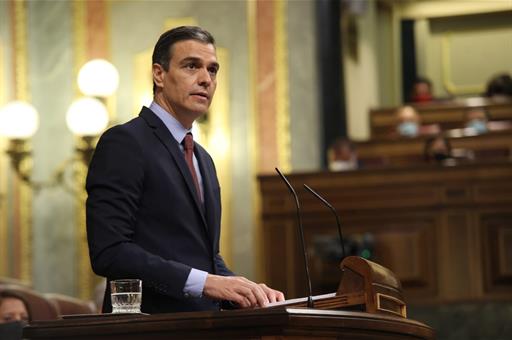Appearance at plenary session of Lower House
Pedro Sánchez argues that Europe has again responded on a united front to protect its citizens from the COVID-19 crisis
President's News - 2020.7.29
Lower House of Parliament, Madrid
The President of the Government of Spain argued that, with the agreement reached at the extraordinary European Council in July, Europe has responded to the greatest challenge in the last 100 years of its history.
In his opinion, the first lesson to be taken away is that Europe once again believes in unity, in the principle of reciprocity and in a united commitment to continue writing history. The second is that it has not left its citizens behind, particularly the most vulnerable, faced with the crisis caused by the pandemic. The third lesson is that Europe calls for gender equality, social and territorial cohesion and a commitment to the ecological and digital transition from Spain, something that has already formed part of the government project since the start of the term of office.
The President of the Government stressed that the pandemic has not changed the priorities outlined in his investiture speech, but rather has strengthened them. The digitalisation of the economy is, in his opinion, essential to maintain the productive activity through working from home and to maintain the education system. The ecological transformation is essential to stop climate change, improve health and create skilled jobs. Gender equality must be implemented as soon as possible and social cohesion must help unite territorial cohesion. "We don't want insurmountable gaps between different groups - the privileged and the vulnerable, and between urban and rural areas, or between different autonomous regions", he underlined.
"We back the country project we have been working on", argued the President of the Government, who stated that the government's diagnosis is correct and its goals have not changed - to recover growth while creating dignified jobs and companies.
Pedro Sánchez explained that during the European Councils, both ordinary and extraordinary, held since the start of the pandemic, Spain has always called for a consequential and proportionate European response to the situation stemming from the health pandemic. "For the usual European parameters, to make a proposal on 23 April and have it approved unanimously three months later is a collective feat we can be proud of. Europe has not only chosen well, it has chosen quickly".
The President of the Government emphasised that, during the intense negotiations, the government has always claimed, clearly, firmly and proactively, that its priorities were an ambitious fund, mainly formed of transfers rather than just loans.
140 billion euros for Spain over six years
 Pedro Sánchez specified that the package of support for the recovery from the socio-economic consequences of COVID-19 - the so-called "Next Generation EU" - has a provision of 750 billion euros, of which 390 billion will be transfers and 360 billion loans. In addition to the Multiannual Financial Framework 2021-27 of 1.07 trillion euros, the total figure amounts to more than 1.8 trillion euros. "This is a very ambitious agreement, a Marshall Plan that allows us to tackle, with sound backing, the difficult and complex task of socio-economic recovery in Spain and in Europe", he stressed.
Pedro Sánchez specified that the package of support for the recovery from the socio-economic consequences of COVID-19 - the so-called "Next Generation EU" - has a provision of 750 billion euros, of which 390 billion will be transfers and 360 billion loans. In addition to the Multiannual Financial Framework 2021-27 of 1.07 trillion euros, the total figure amounts to more than 1.8 trillion euros. "This is a very ambitious agreement, a Marshall Plan that allows us to tackle, with sound backing, the difficult and complex task of socio-economic recovery in Spain and in Europe", he stressed.
Over the next six years, claimed Pedro Sánchez, Spain will receive 140 billion euros, equivalent to 11% of its GDP in 2019, in addition to that which corresponds under the Budget of the Multiannual Financial Framework. Two of the main programmes under the Recovery Fund approved are the "Recovery and Resilience Facility", aimed at reforms and structural social and economic investments, which will allocate 59 billion euros in transfers to our country, and the "React European Union", designed to directly address the consequences of the COVID-19 crisis, with an allocation of 12.4 billion euros.
The President of the Government stated that the government is already working to present the Investment and Reform Plans, compliance with which will decide the arrival of funding. These plans must be evaluated by the European Commission and then approved by the European Council. "We have a huge managerial challenge ahead of us", he argued, to "absorb all these resources in six years and transform our economy".
The plans must be based on the criteria agreed between all the Member States, which include the digital transformation, the green transition and improved education and human capital. These priorities, said the President of the Government, constitute a tremendous opportunity to once again set out on the path of growth on much sounder and more sustainable foundations. "Within a decade, we must be able to say that Spain globally heads up the digital economy and the green economy".
The President of the Government also referred to the approval of 7.5 billion euros for the Common Agricultural Policy (CAP) and the continuity of the amount for direct aid to farmers, rural development measures and market measures.
Pedro Sánchez also expressed his conviction that the European example must serve "to spur on and inspire" Spain to achieve unity and consensus, and called for parliamentary groups to achieve this. "If Europe can then Spain must be able to. We must ensure that agreements are reached. Now it falls on us".
Non official translation
More Info
- Pedro Sánchez backs creation of great recovery fund of 1.5 trillion euros (2020/04/23)
- Pedro Sánchez asks European Union for urgent response at level of crisis caused by COVID-19 pandemic (2020/06/19)
- "Europe has stood up to an historic challenge and found a response with an historic agreement", says Pedro Sánchez (2020/07/21)
- Government to allocate 140 billion euros from European Recovery Fund to modernise economy and alleviate social effects of COVID-19 (2020/07/21)





